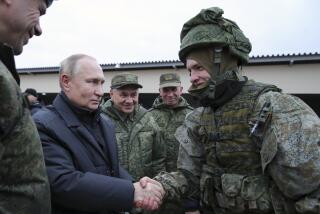Reluctant Soviet, German Soldier : Unlucky Estonian Had Habit of Being on the Wrong Side
- Share via
MADERA, Calif. — Jake Sang was in the wrong place at the wrong time during World War II.
When Germany invaded the Soviet Union, Sang was serving in the Russian army.
But when Germany neared defeat, Sang was fighting for the Germans.
Sang, now credit manager for an FMC Corp. plant near this central California city, didn’t have any choice either time.
He is a native of Estonia, which in 1940 came under the control of its eastern neighbor, the Soviet Union. Sang, then 18, had spent a year in the Estonian army and was ushered into the Russian army before the German invasion.
When the Germans captured roads that he and other Estonians were supposed to guard, they headed home, Sang recalls. But the Germans caught up with them at the border and sent them to a prison camp.
Released From Camp
Eight months later, the Germans decided the Estonians weren’t the enemy and let them go home.
Sang got married, became an accountant and happily let the war progress without his help until 1943.
“I thought that life was nice,” he said in an interview. “I knew that it wasn’t all over, but I didn’t know what would happen next.”
The next twist was a German invasion of Estonia and a mobilization of healthy young men like Sang into the German army.
He was shipped to the Russian front to fight his former comrades and suffered a minor wound at the River Narva as the Russians chased the Germans after the battle of Leningrad.
Sang was sent home to recuperate. Worried that the Russians might consider him a traitor, he took his wife and son to Germany on a hospital ship.
Conscripted Again
Again, he was conscripted into the military.
“But I was relatively lucky this time,” Sang said. “I was pushed from training camp to training camp.”
He wound up in Czechoslovakia and surrendered during a local uprising against the Germans as the war neared its end in 1945.
Sang spent the next four years as a prisoner before being released and reunited with his family. They came to the United States in 1950 and to this farming community in 1981.
Sang says he disliked the Russian army more than the German army.
“We were brought up in an independent, democratic spirit; we were taught to love our country,” he explains. “We didn’t have much sympathy for the Russians. They have a very political army with a lot of time spent on political lectures.
“And their chow was lousy.”
More to Read
Sign up for Essential California
The most important California stories and recommendations in your inbox every morning.
You may occasionally receive promotional content from the Los Angeles Times.













